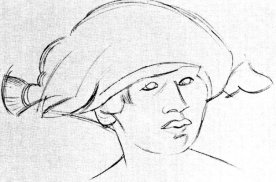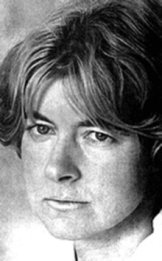‘It is possible that we are being led by different ways into the same prohibited and doubtful neighbourhood.’
Jessie Dismorr, ‘Promenade’, 1915

Jessie Dismorr by Wyndham Lewis, 1922
The new Flashpoint online magazine has a useful piece by Francesca Brooks on Jessie Dismorr, Vorticist painter, poet and flâneuse, whose artworks and writings can be found extensively on my pages up above. Brooks focuses pretty much entirely on Dismorr’s two urbanist prose poems published in 1915 in Blast 2. Her tie-in of Dismorr with Guy Debord and the dérive is apt and necessary; we can easily overlook the romantic roots of situationist thought, and the dérive is derived from Baudelairean flânerie. Brooks’s bracketing of Dismorr with Virginia Woolf is viable, if a little elastic. A closer relation to Dismorr’s poetic urbanism might be Hope Mirrlees’s explosively modernist poem Paris of 1919; Mirrlees was well acquainted with the Woolfs (whose Hogarth Press published Paris), so there’s the link to Virginia if you want it.

Rosemary Tonks, 1968
But perhaps we can also relate Dismorr to the later British Baudelairean and flâneuse Rosemary Tonks, whose work has been subjected to a rediscovery following her death in 2014. (Not too great a stretch; Tonks was published by the mid ‘fifties, and the distance between Dismorr and Tonks is less than that between Tonks and today.)
To illustrate the relation, here’s a juxtaposition of two journeys by Dismorr and Tonks, each on the upper deck of a London bus. First, from Dismorr’s venture aboard a number 43 with her annoying suitor ‘Roderigo’, in ‘June Night’ of 1915. (This was an inward journey. The 43 route ran from Muswell Hill to London Bridge.) Roderigo is later left on the bus, as Dismorr wanders London on foot, abandoning the romantic, protecting male and pioneering the occupation of metropolitan spaces by the lone emancipated woman.
‘No 43 bus, its advertisements all lit from within, floats towards us like a luminous balloon. We cling to it and climb to the top. Towards the red glare of the illuminated city we race through interminable suburbs. These are the bare wings and corridors that give on to the stage. Swiftness at least is exquisite. But it makes me too emotional. Amazing, these gymnastic agitations of the heart! Your blindness, my friend Roderigo, is your most intelligent attribute.

Claude Flight, ‘Descent from the Bus’, 1927
The Park, to our left, glimmers through strips of iron. Its lawns of antique satin are brocaded with elaborate parterres, whose dyes are faded beyond recognition. Dark as onyx with rims of silver are the little pools that suck in the dew. The tea-kiosk of whitened stucco is as remote as a temple shuttered up against the night. My desires loiter about the silent spaces.
We stop for passengers at Regent’s Corner. Here crowds swarm under green electric globes. Now we stop every moment, the little red staircase is besieged. The bus is really too top-heavy. It must look like a great nodding bouquet, made up of absurd flowers and moths and birds with sharp beaks. I want to escape but Roderigo is lazy and will not stop warbling his infuriating lovesongs. Ribbons of silver fire start into the air, and twist themselves into enormous bows with fringes of tiny dropping stars. Everybody stands up and screams. These people are curious, but not very interesting; they lack reticence. Ah, but the woman in the purple pelisse is too beautiful! I refuse to look at her when she stares round.
It is hot for a night in June. “Che, che, la donna.” Roderigo, you have a magnificent tenor voice, but you bore me. Your crime is that I can no longer distinguish you from the rest of the world.’
And here is a bit of Tonks’s comparable solo London bus trip (route number not given) in ‘An Old-fashioned Traveller on the Trade Routes’, published in 1967:
‘I was sitting upstairs in a bus, cursing the waste of time, and pouring my life away on one of those insane journeys across London – while gradually the wavering motion of this precarious glass salon, that flung us about softly like trusses of wheat or Judo Lords, began its medicinal work inside the magnetic landscape of London.
The bus, with its transparent decks of people, trembled. And was as uniquely ceremonious in propelling itself as an eminent jellyfish with an iron will, by expulsions, valves, hisses, steams, and emotional respirations. A militant, elementary, caparisoned Jellyfish, of the feminine sex, systematically eating and drinking the sea.
I began to feel battered as though I had been making love all night! My limbs distilled the same interesting wide-awake weariness.
We went forward at a swimmer’s pace, gazing through the walls that rocked the weather about like a cloudy drink from a chemist’s shop – with the depth and sting of the Baltic. The air-shocks, the sulphur dioxides, the gelatin ignitions!’
But another, quite different point of contact between Dismorr and Tonks is their abrupt and near absolute abandonment of writing. After some vicious comments in The Little Review of 1919 Dismorr‘s poetry underwent a 15 year hiatus and the following year she suffered a nervous breakdown. In the late ‘seventies, after a series of personal and health crises, Rosemary Tonks repudiated her writings entirely and began a largely solitary religious life, sparking literary chatter of a ‘vanishing’.
In Tonks’s poems the urge to ‘escape’ had already motivated her urban wanderings:
‘It is among the bins and dormitories of cities …
That one goes to gormandise upon Escape!’
But this lifestyle was marked by a deep and growing self-disgust –
‘… if you knew the exotic disgust that grips me
After another bestial night
As we come in, broken …’
– and a consequent crisis of the sense of self:
‘And afterwards you’ll live in no man’s land,
You’ll lose your identity, and never get yourself back, diablotin,
It may have happened already, and as you read this …
Ah, it has happened already.’
The urge to escape the existing self – whether through boredom, despair or disgust – can visit any of us. In this Age of Choice we believe that it is our right to be free of it, and are furnished with a variety of means to that end, ranged along the safety spectrum: a new hair style, moving house, body modification, transvestism, multiple personality disorder, dissociative fugue, suicide. While for the writer there is the option to write about something different in a different way, to become a different writer and so a different person. Or even to reject writing itself.
 In Tonks’s case a double standard seems to operate. With the best will in the world Neil Astley’s introduction to Bloodaxe’s new Tonks Collected, Bedouin of the London Evening, betrays some pejorative assumptions about Tonks’s post-writerly life – ‘self torturing’, ‘socially challenged’ and so on. OK then for Rimbaud, Tonks’s model as a poet, to abandon writing and disappear into an African sunset when gun running or whatever he got up is seen as modishly edgy. Not so acceptable somehow for the elderly Mrs Rosemary Lightband neé Tonks to be handing out translations of the Bible at Speaker’s Corner, or (most unforgiveable of all) incinerating her priceless collection of Oriental artefacts, which she had come to regard as dangerous and undermining idols. But what do we really want here – a miserable writer or a happier human being?
In Tonks’s case a double standard seems to operate. With the best will in the world Neil Astley’s introduction to Bloodaxe’s new Tonks Collected, Bedouin of the London Evening, betrays some pejorative assumptions about Tonks’s post-writerly life – ‘self torturing’, ‘socially challenged’ and so on. OK then for Rimbaud, Tonks’s model as a poet, to abandon writing and disappear into an African sunset when gun running or whatever he got up is seen as modishly edgy. Not so acceptable somehow for the elderly Mrs Rosemary Lightband neé Tonks to be handing out translations of the Bible at Speaker’s Corner, or (most unforgiveable of all) incinerating her priceless collection of Oriental artefacts, which she had come to regard as dangerous and undermining idols. But what do we really want here – a miserable writer or a happier human being?
As Astley reveals, Tonks’s single minded reliance on the love of God freed her from healers and mediums, from sleeping tablets, from depression and from fear. So what if she characterised her bouts of depression as Satan’s attempts to undermine her? Perfectly reasonable, for such they were and are, if the term ‘Satan’ is to have any useful meaning. And birdsong and great music were for her positive influences direct from God? Well, that’s undeniable.
Though if the gain was hers and the loss is entirely ours, it is, to be fair, a real loss. An apposite message about Tonks arrived recently from Robert Worby, of Radio 3’s Hear and Now:
‘Last night I had a powerful, resonant dream about her. I found myself in a disused library that seemed to be part of something like a church institution: a WI meeting place maybe. It was dilapidated with books and papers scattered about the floor. As I wandered around I found copies of Tonks’s books and what seemed to be handwritten manuscripts. I was flabbergasted; I couldn’t believe my luck. I collected them together with the intention of taking them away but an elderly lady politely announced that I wouldn’t be able to do that; all the materials had to stay in that room; they weren’t being thrown away.’
I can’t deny that I very much recognise this dream narrative of recovery. We are all antiquarians these days. In the disused and labyrinthine libraries of our longings lie scattered the many dusty manuscripts of our misplaced desires. But they don’t all bear our handwriting. It is the writer alone who owns the absolute liberty to jettison or burn her own pages, without fear of retrieval.



